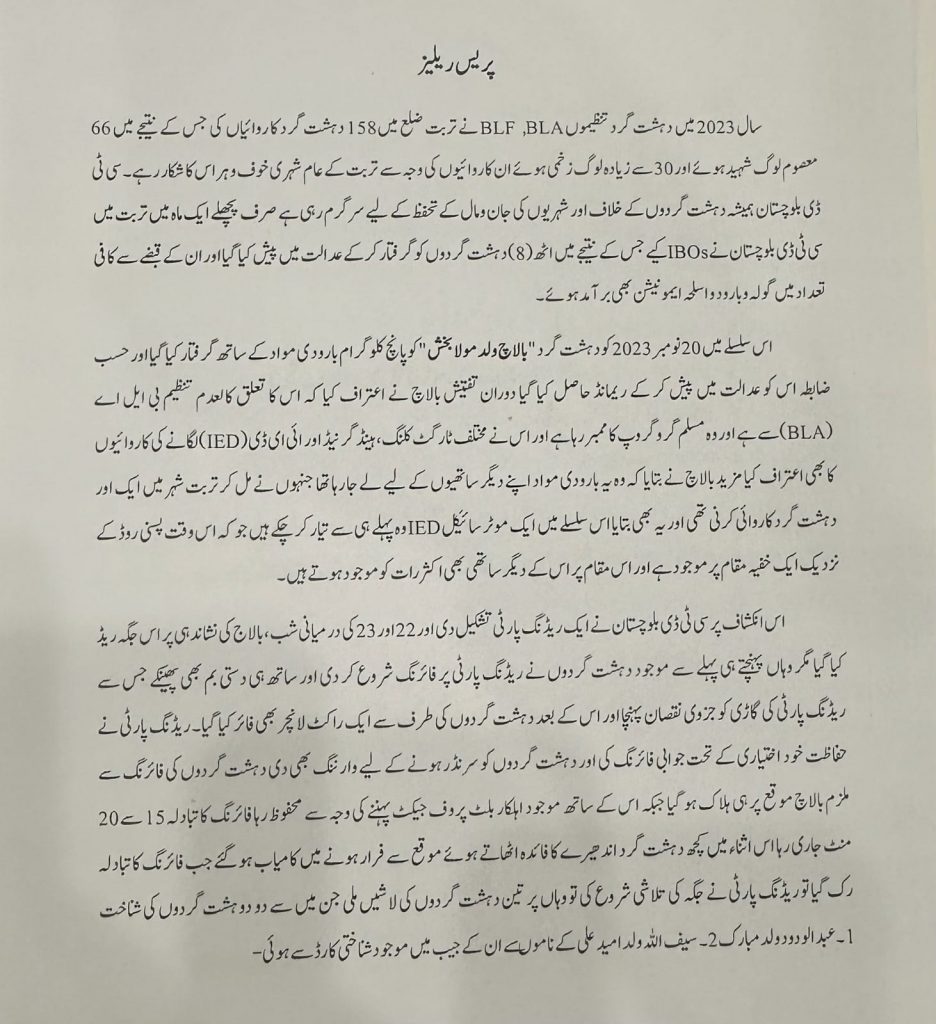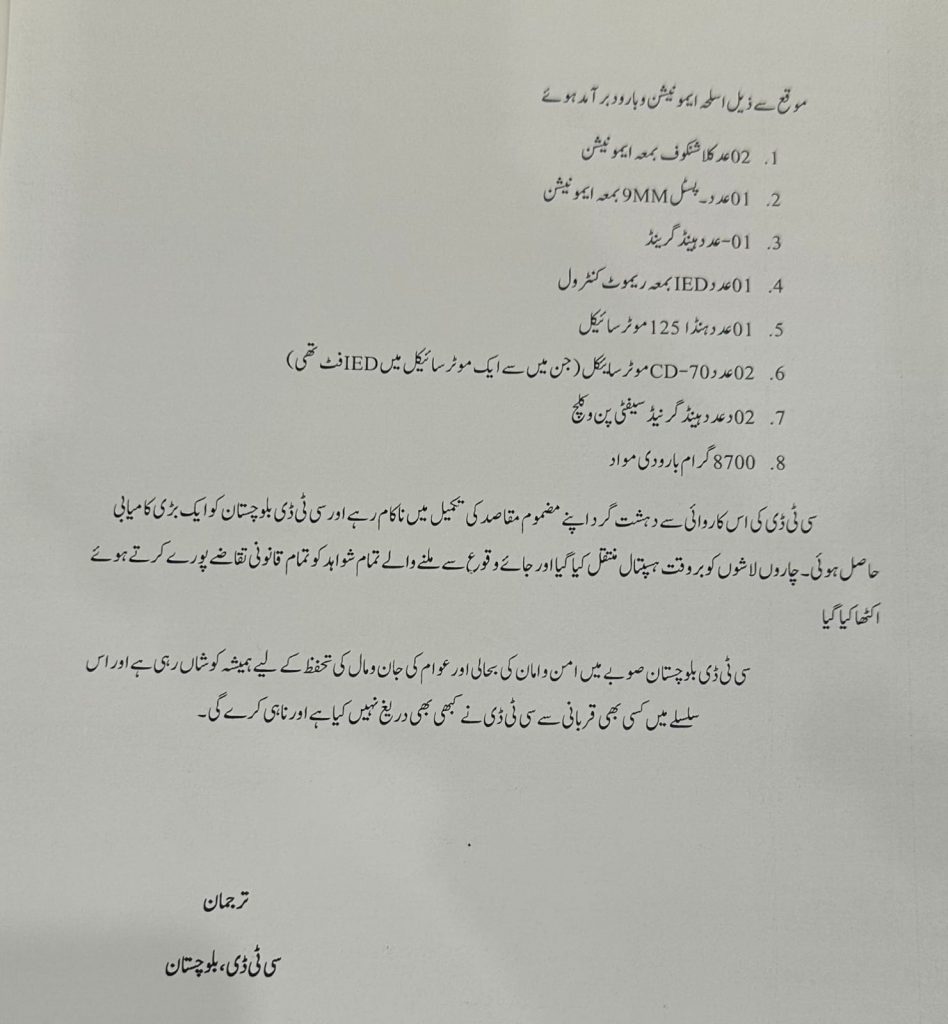Author: Fareed Baloch
In the early hours of November 23, 2023, Turbat’s Pasni Road became the scene of a contentious operation by Pakistan’s Counter-Terrorism Department (CTD). The incident, resulting in four fatalities, quickly became a subject of controversy, with conflicting narratives emerging about the nature of the operation and the identities of the deceased.
The CTD’s Stance on the Turbat Encounter:
The CTD, in a detailed press release, described the operation as a direct response to escalated militant activities by separatist groups like the BLA and BLF in 2023. They reported 158 attacks, resulting in the deaths of 66 individuals and over 30 injuries. The CTD emphasized its intensified intelligence-based operations in recent months, leading to the arrest of eight ‘terrorists’ and the seizure of ammunition and weapons.
A significant breakthrough, according to the CTD, was the arrest of Balach, son of Mola Bakhsh, on November 20. He was allegedly apprehended with five kilograms of explosives and confessed during interrogation to his affiliation with the BLA and his involvement in target killings, grenade attacks, and the planting of improvised explosive devices (IEDs). The CTD statement further stated that Balach also disclosed plans to deliver explosives to accomplices for a planned attack in Turbat and revealed the location of a motorcycle rigged with IEDs on Pasni Road, a known rendezvous point for his associates.
Acting on this intelligence, the CTD organized a raiding party between the nights of November 22 and 23. The operation, according to the CTD, quickly escalated when they encountered heavy fire from militants at the location identified by Balach. The militants allegedly used hand grenades and rocket launchers, leading to a fierce exchange of fire.
During this confrontation, Balach was killed, alongside three other militants, two of whom were identified as Abdul Wadood, son of Mubarak, and Saifullah, son of Umeed Ali, through ID cards found at the scene.
Contrasting Narratives and Allegations of a Fake Encounter:
The narrative provided by the Counter-Terrorism Department on the Turbat encounter was met with immediate skepticism and counterclaims from various quarters. Media investigations, local sources, and human rights activists presented a markedly different story, casting doubt on the CTD’s version of the events and alleging another staged encounter by the CTD.
Central to this counter-narrative was the case of Balach, son of Mola Bakhsh. Contrary to the CTD’s claims of him being a militant caught with explosives on November 20, local sources and family members revealed that Balach had been a victim of enforced disappearance since October 29, 2023. His family reported that only two days before the alleged encounter, Balach had been presented before a judicial magistrate and remanded to the CTD for ten days.
Similarly, Saifullah, son of Umeed Ali, who had reportedly disappeared on August 1st, 2023, and Shakoor Baloch, detained from Tump on June 25, were also victims in this incident, adding to the allegations of a pattern of enforced disappearances and subsequent killings.
The identity of the fourth victim, Wadood, son of Mubarak, a resident of Panjgur and a previously missing person, was also confirmed on Friday, with reports stating his body is being transferred to Panjgur.
In the aftermath of the incident, social media platforms, particularly ‘X’ (formerly known as Twitter), saw an outpouring of reactions from human rights groups, journalists, and individual activists. Comments ranged from outright condemnation of the CTD’s encounter to calls for international scrutiny.
The Baloch National Movement’s Human Rights Department, Paank, strongly criticized the CTD’s operation, labeling it a ‘fake’ encounter. The group wrote on ‘X’: “Another fake encounter in Balochistan. Four previously abducted Baloch youth, including Balach Mola Bakhsh, reportedly killed by Pakistani forces. This disturbing trend of extrajudicial actions must be condemned. Urgent international scrutiny and justice are imperative.”
Kiyya Baloch, a journalist, expressed dismay at the judicial implications of the Turbat encounter. Highlighting the case of Balach, Kiyya questioned the integrity of a system where an individual scheduled for a court hearing ends up dead in a police encounter.
Human rights activist MahRang Baloch captured the gravity of the situation, stating on ‘X’, “The Baloch Nation stands at a crucial juncture in history, faced with ‘severe genocide’. The mutilated bodies of four young men urge us toward collective struggle. Our failure to react collectively as a nation results in our living youths being turned into mutilated corpses every day.”
Shafiq Ahmed, an advocate, brought attention to the case of Balach: “In October, Balach Mola Bakhsh was abducted by the security forces in Turbat. After protests, the CTD registered a fake case against him. Recently presented in court and remanded for ten days, he was extra-judicially killed, along with four others. Now, relatives are protesting for justice.”
The HR Council of Balochistan strongly criticized the CTD’s actions, highlighting the deaths of four youths, including identified victims previously in custody, as indicative of systematic human rights violations. They called for an immediate and comprehensive investigation into the CTD and its operations.
A Pattern of Controversy: Historical Context of CTD Operations:
The recent encounter in Turbat is not an isolated incident but part of a disturbing trend in the CTD’s history in Balochistan. Several past operations have attracted allegations similar to those in Turbat, suggesting a pattern of controversial counter-terrorism practices. Notable incidents later revealed as ‘fake’ encounters include:
Balgathar Incident (November 19, 2023): In Balgathar, three missing individuals were found dead following a car explosion. The vehicle, previously confiscated by the CTD, was involved in what was officially reported as an IED detonation. However, eyewitnesses and human rights groups contested this, alleging a staged explosion. The victims, identified as Mohammad Adil, Shahjahan, and Nabi Daad, were reportedly victims of enforced disappearance.
Khuzdar Encounter (November 9, 2023): The CTD’s Khuzdar operation, resulting in three deaths, was contested by rights groups and media investigations, revealing that at least two deceased identified as Aftab Sumalani and Abdullah had been reported missing.
Quetta Operation (October 2023): In Quetta, two individuals killed in a CTD operation were later identified by families and advocacy groups as previously missing persons, fueling skepticism about the CTD’s reported encounters. The deceased were identified as Muhammad Yousuf Nichari and Mohammad Shafi Bangulzai.
Khuzdar Encounter (September 2023): In Khuzdar, the deaths of Ameer Bakhsh and Ejaz Ahmed in a CTD operation were questioned, particularly Ejaz Ahmed’s case, as he had been abducted by Pakistani forces prior to the incident.
Mastung and Nushki Shootouts (November 2022): Claims of militant fatalities in Mastung and Nushki by the CTD were refuted by rights groups, who argued that the deceased were documented missing persons. Identified victims included Abdullah Satakzai, Mushtaq, Ali Ahmad, Habib Ur Rehman, Muhammad Dawood, Tabish Waseem, Salal, Fareed, and Niyaz.
Mastung Incident (March, 2021): Jameel and Sami Pirkani, arrested by Eagle Force and later handed over to the CTD, were killed along with three others, Arif Marri, Yousuf Marri, and Shah Nazar, in what was claimed as a shootout. However, investigations indicated that all five were already under detention, challenging the authenticity of the CTD’s claims.
Rajan Pur Operation (August 2020) and Quetta Raids (2018): In a CTD operation in Rajan Pur, five Bugti tribesmen, earlier reported missing, were killed and later identified as Dost Mohammad, Ghulam Hussain, Master Ali, Ramzan, and Atta Mohammad Bugti. Similarly, incidents in Quetta, including the deaths of a woman and a child, were condemned as fake encounters by advocacy groups and Baloch political organizations.
From ‘Kill and Dump’ to Alleged Fake Encounters: A Shift in Strategy
In recent years, the Pakistani state’s approach in Balochistan has shifted from the widely criticized ‘Kill and Dump’ policy—marked by enforced disappearances and the discovery of tortured bodies and mass graves—to framing operations as legitimate encounters against ‘terrorists.’
This apparent change, likely in response to increased global condemnation of human rights violations inherent in the ‘Kill and Dump’ policy, hasn’t resolved the core issue of state-sanctioned abuses. Instead, it represents a shift to a more covert form of rights violation, with missing persons often reported as casualties in supposed encounters with security forces.
This strategy, while creating a veneer of legitimacy, perpetuates the cycle of abuse under the guise of counter-terrorism. The dual purpose of these alleged encounters is to lend a facade of legitimacy to operations that might otherwise be condemned as human rights abuses and maintain a narrative of fighting terrorism that is more acceptable than the grim realities of enforced disappearances and extrajudicial killings.
Therefore, the ongoing situation in Balochistan requires heightened international scrutiny and accountability, emphasizing the need to protect the rights and dignity of the Baloch people amidst these concerning state strategies.
































